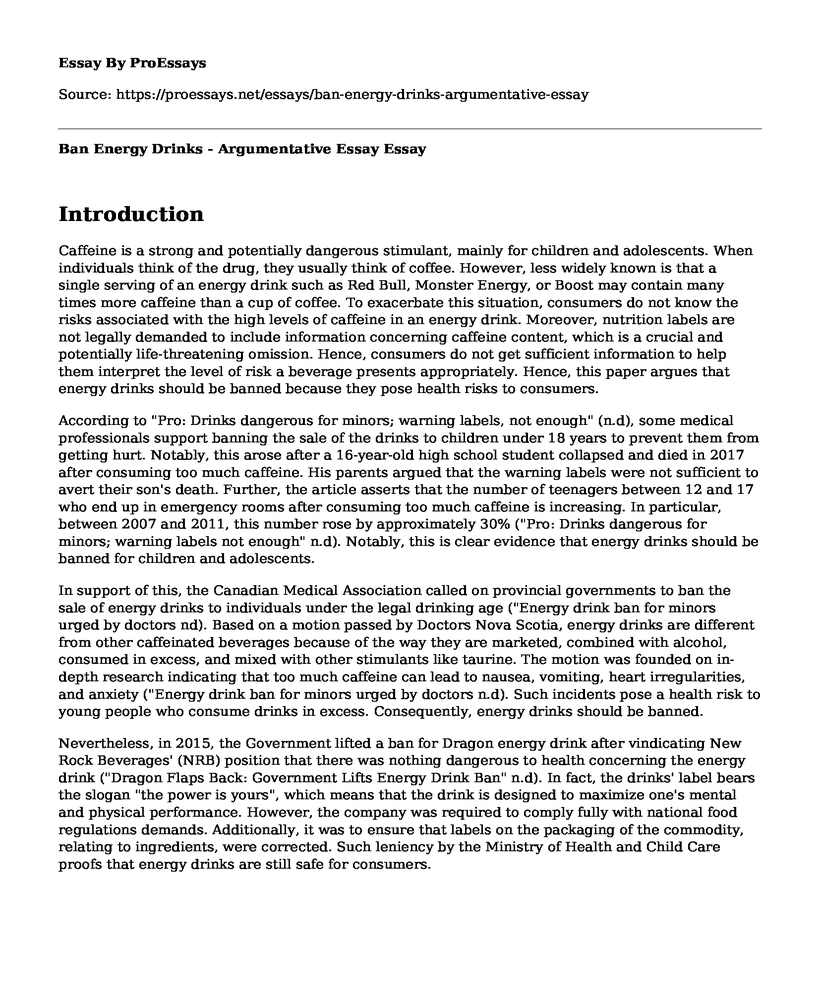Introduction
Caffeine is a strong and potentially dangerous stimulant, mainly for children and adolescents. When individuals think of the drug, they usually think of coffee. However, less widely known is that a single serving of an energy drink such as Red Bull, Monster Energy, or Boost may contain many times more caffeine than a cup of coffee. To exacerbate this situation, consumers do not know the risks associated with the high levels of caffeine in an energy drink. Moreover, nutrition labels are not legally demanded to include information concerning caffeine content, which is a crucial and potentially life-threatening omission. Hence, consumers do not get sufficient information to help them interpret the level of risk a beverage presents appropriately. Hence, this paper argues that energy drinks should be banned because they pose health risks to consumers.
According to "Pro: Drinks dangerous for minors; warning labels, not enough" (n.d), some medical professionals support banning the sale of the drinks to children under 18 years to prevent them from getting hurt. Notably, this arose after a 16-year-old high school student collapsed and died in 2017 after consuming too much caffeine. His parents argued that the warning labels were not sufficient to avert their son's death. Further, the article asserts that the number of teenagers between 12 and 17 who end up in emergency rooms after consuming too much caffeine is increasing. In particular, between 2007 and 2011, this number rose by approximately 30% ("Pro: Drinks dangerous for minors; warning labels not enough" n.d). Notably, this is clear evidence that energy drinks should be banned for children and adolescents.
In support of this, the Canadian Medical Association called on provincial governments to ban the sale of energy drinks to individuals under the legal drinking age ("Energy drink ban for minors urged by doctors nd). Based on a motion passed by Doctors Nova Scotia, energy drinks are different from other caffeinated beverages because of the way they are marketed, combined with alcohol, consumed in excess, and mixed with other stimulants like taurine. The motion was founded on in-depth research indicating that too much caffeine can lead to nausea, vomiting, heart irregularities, and anxiety ("Energy drink ban for minors urged by doctors n.d). Such incidents pose a health risk to young people who consume drinks in excess. Consequently, energy drinks should be banned.
Nevertheless, in 2015, the Government lifted a ban for Dragon energy drink after vindicating New Rock Beverages' (NRB) position that there was nothing dangerous to health concerning the energy drink ("Dragon Flaps Back: Government Lifts Energy Drink Ban" n.d). In fact, the drinks' label bears the slogan "the power is yours", which means that the drink is designed to maximize one's mental and physical performance. However, the company was required to comply fully with national food regulations demands. Additionally, it was to ensure that labels on the packaging of the commodity, relating to ingredients, were corrected. Such leniency by the Ministry of Health and Child Care proofs that energy drinks are still safe for consumers.
Conclusion
To conclude, although manufacturers of energy drinks claim that they are designed to maximize one's mental and physical performance, this paper supports the ban on them because they pose health risks to consumers. Such risks are more prevalent among children and adolescents since they consume drinks in high quantities. The caffeine in energy drinks leads to nausea, vomiting, heart irregularities, and anxiety. Many youths continue to be admitted to emergency rooms after high consumption of energy drinks while others die from the related health risks. Therefore, it is crucial to ban the energy drinks to avert this problem.
Work Cited
"Dragon Flaps Back... Government Lifts Energy Drink Ban." All Africa, 6 Nov. 2015. Global Issues in Context, http://link.galegroup.com/apps/doc/A434279794/OVIC?u=txshracd2489&sid=OVIC&xid=7d000626. Accessed 26 Nov. 2018
"Energy drink ban for minors urged by doctors." The Canadian Broadcasting Corporation, 22 Aug. 2013. Opposing Viewpoints in Context, http://link.galegroup.com/apps/doc/A340411858/OVIC?u=txshracd2489&sid=OVIC&xid=abe73a7a. Accessed 26 Nov. 2018
"Pro: Drinks dangerous for minors; warning labels not enough." Victoria Advocate {Victoria, TX}, 21 May 2018. Opposing Viewpoints in Context, http://link.galegroup.com/apps/doc/A539634060/OVIC?u=txshracd2489&sid=OVIC&xid=e6a1ece2. Accessed 26 Nov. 2018
Cite this page
Ban Energy Drinks - Argumentative Essay . (2022, Oct 17). Retrieved from https://proessays.net/essays/ban-energy-drinks-argumentative-essay
If you are the original author of this essay and no longer wish to have it published on the ProEssays website, please click below to request its removal:
- Nutritional Communication and Human Services Essay
- Essay Sample on the Extraordinary Science of Addictive Junk Food
- Kid-Focused Marketing of Fast Food Increase the Risk of Obesity Essay
- Assignment Example on Fast Food to All Food
- Ancient Greek & Roman Diet: A Carbohydrate-Rich Diet - Essay Sample
- Balanced Diets: Key to Kids' Health & Development - Essay Sample
- Starbucks: Tech-Driven Competitive Advantage & Porter's Five Forces - Essay Sample







